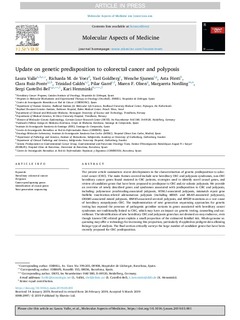| dc.contributor.author | Valle, Laura | |
| dc.contributor.author | de Voer, Richarda M. | |
| dc.contributor.author | Goldberg, Yael | |
| dc.contributor.author | Sjursen, Wenche | |
| dc.contributor.author | Försti, Asta | |
| dc.contributor.author | Ruiz-Ponte, Clara | |
| dc.contributor.author | Caldés, Trinidad | |
| dc.contributor.author | Garré, Pilar | |
| dc.contributor.author | Olsen, Maren Fridtjofsen | |
| dc.contributor.author | Nordling, Margareta | |
| dc.contributor.author | Castellví-Bel, Sergi | |
| dc.contributor.author | Hemminki, Kari | |
| dc.date.accessioned | 2020-01-16T09:49:27Z | |
| dc.date.available | 2020-01-16T09:49:27Z | |
| dc.date.created | 2019-06-03T16:36:11Z | |
| dc.date.issued | 2019 | |
| dc.identifier.citation | Molecular Aspects of Medicine. 2019, 1-17. | nb_NO |
| dc.identifier.issn | 0098-2997 | |
| dc.identifier.uri | http://hdl.handle.net/11250/2636588 | |
| dc.description.abstract | The present article summarizes recent developments in the characterization of genetic predisposition to colorectal cancer (CRC). The main themes covered include new hereditary CRC and polyposis syndromes, non-CRC hereditary cancer genes found mutated in CRC patients, strategies used to identify novel causal genes, and review of candidate genes that have been proposed to predispose to CRC and/or colonic polyposis. We provide an overview of newly described genes and syndromes associated with predisposition to CRC and polyposis, including: polymerase proofreading-associated polyposis, NTHL1-associated polyposis, mismatch repair gene biallelic inactivation-related adenomatous polyposis (including MSH3- and MLH3-associated polyposes), GREM1-associated mixed polyposis, RNF43-associated serrated polyposis, and RPS20 mutations as a rare cause of hereditary nonpolyposis CRC. The implementation of next generation sequencing approaches for genetic testing has exposed the presence of pathogenic germline variants in genes associated with hereditary cancer syndromes not traditionally linked to CRC, which may have an impact on genetic testing, counseling and surveillance. The identification of new hereditary CRC and polyposis genes has not deemed an easy endeavor, even though known CRC-related genes explain a small proportion of the estimated familial risk. Whole-genome sequencing may offer a technology for increasing this proportion, particularly if applied on pedigree data allowing linkage type of analysis. The final section critically surveys the large number of candidate genes that have been recently proposed for CRC predisposition. | nb_NO |
| dc.language.iso | eng | nb_NO |
| dc.publisher | Elsevier | nb_NO |
| dc.rights | Attribution-NonCommercial-NoDerivatives 4.0 Internasjonal | * |
| dc.rights.uri | http://creativecommons.org/licenses/by-nc-nd/4.0/deed.no | * |
| dc.title | Update on genetic predisposition to colorectal cancer and polyposis | nb_NO |
| dc.type | Journal article | nb_NO |
| dc.type | Peer reviewed | nb_NO |
| dc.description.version | publishedVersion | nb_NO |
| dc.source.pagenumber | 1-17 | nb_NO |
| dc.source.journal | Molecular Aspects of Medicine | nb_NO |
| dc.identifier.doi | 10.1016/j.mam.2019.03.001 | |
| dc.identifier.cristin | 1702402 | |
| dc.description.localcode | © 2019 The Authors. Published by Elsevier Ltd. This is an open access article under the CC BY-NC-ND license (http://creativecommons.org/licenses/by-nc-nd/4.0/). DOI: 10.1016/j.mam.2019.03.001 | nb_NO |
| cristin.unitcode | 1920,14,0,0 | |
| cristin.unitcode | 194,65,15,0 | |
| cristin.unitname | Laboratoriemedisinsk klinikk | |
| cristin.unitname | Institutt for klinisk og molekylær medisin | |
| cristin.ispublished | true | |
| cristin.fulltext | original | |
| cristin.qualitycode | 1 | |

